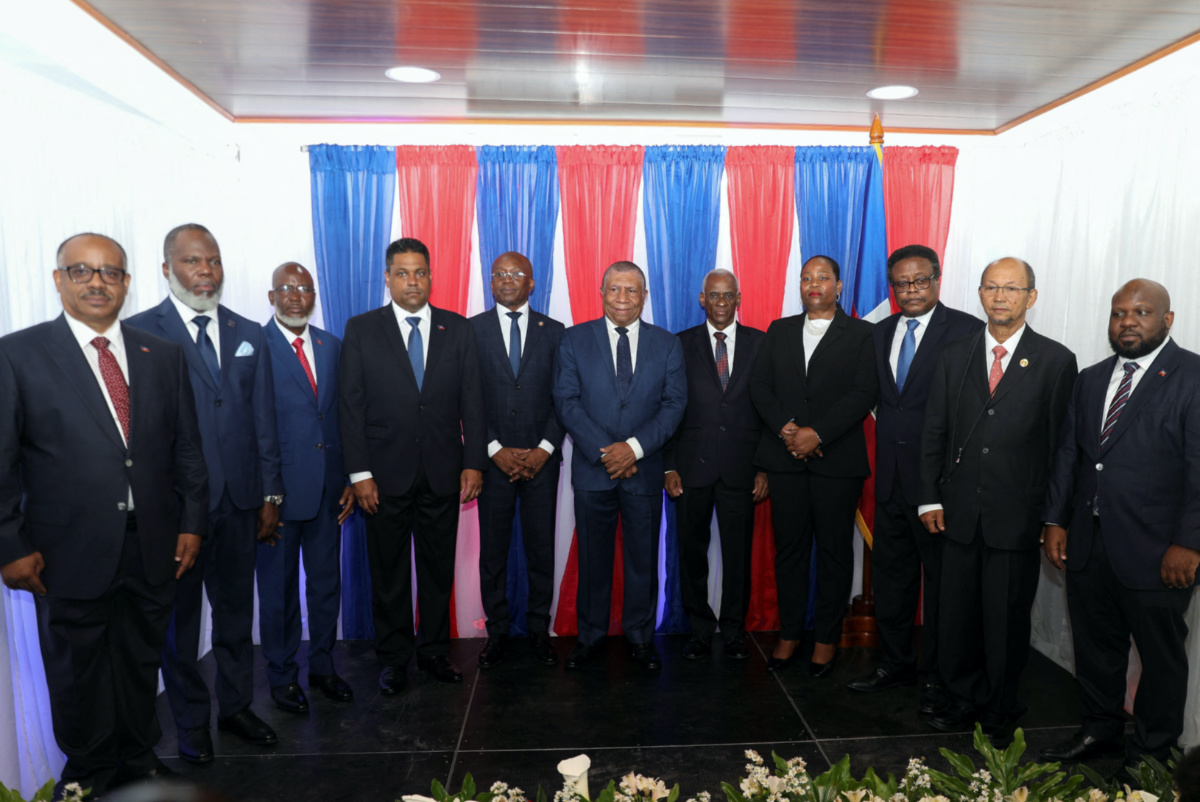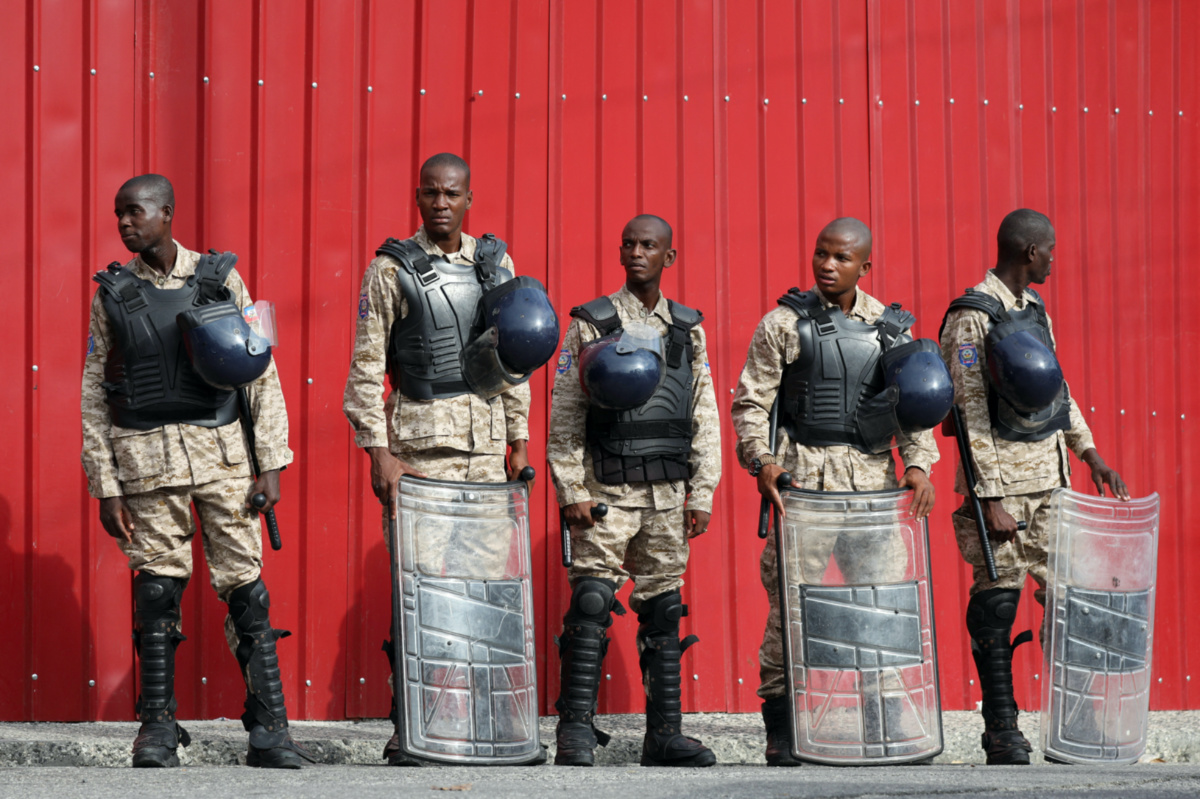Port-au-Prince. Haiti
Reuters
Haiti’s transition council took power in a ceremony on Thursday, formalising the resignation of former Prime Minster Ariel Henry as the Caribbean country seeks to establish security after years of gang violence wreaking chaos and misery.
Henry’s Finance Minister, Michel Patrick Boisvert, will be interim Prime Minister until the transition council appoints a new head of government, a cabinet and a provisional electoral council set to pave the way for an eventual vote.

Louis Gerald Gilles, Frinel Joseph, Emmanuel Vertilaire, Laurent Saint-Cyr, Michel Patrick Boisvert, Jean Joseph Lebrun, Edgard Leblanc Fils, Regine Abraham, Fritz Alphonse Jean, Leslie Voltaire and Smith Augustin pose for a photograph during Haiti’s Transitional Council ceremony, on the outskirts of Port-au-Prince, Haiti, on 25th April, 2024. PICTURE: Reuters/Ralph Tedy Erol
“Today is an important day in the life of our dear republic, this day in effect opens a view to a solution,” Boisvert said after the nine-person transition council were sworn in on Thursday morning.
Regine Abraham, a non-voting council member, thanked Haiti’s security forces and international mediators, and said the council would focus on security, a national consultation on constitutional reform, preparing for elections, rebuilding the judiciary system and the economy.
“We are seeing the total collapse of our institutions and failure of a government,” she said.
Port-au-Prince residents have “literally been taken hostage,” she added. “Facing this unprecedented crisis, the entire population has recognized the urgent need of a firm hand to take us out of this spiral of despair and destruction.”
Even as the council was sworn in, local media reported houses being set on fire and shooting in the capital’s downtown and Delmas areas, posting photos of tall columns of gray smoke rising above the skyline and videos of families leaving the area with their belongings.
Armed gangs, equipped with weapons trafficked largely from the United States, have for years tightened their grip on the capital and sought to topple Henry. Since he pledged to resign last month, they have called for a broader “revolution”.
Earlier this week, gang leader Jimmy “Barbeque” Cherizier warned members of the transition council to “brace” themselves.
Unverified voice recordings circulated on social media over the weekend in which Cherizier appeared to order his soldiers to indiscriminately burn houses in Lower Delmas, an impoverished part of the capital where he grew up.
At the ceremony, hosted amid tight security at the Prime Minister’s Villa d’Accueil office, Boisvert and members of the transition council were flanked by top police and military officials.
Henry announced last month he would resign once the council was in place, initially expected to happen within a couple of days but delayed amid disagreements as to who should sit on it.
Henry had left Haiti in late February seeking support for the country’s outgunned police, but was left stranded in Puerto Rico as the gangs threatened to completely take over the capital. Boisvert has served as acting prime minister in Henry’s absence.
The transitional government’s mandate runs until February, 2026, by when there are slated to be elections, and cannot be renewed. No date has been set for its naming of a new prime minister or council president.

New interim Prime Minister of Haiti, Michel Patrick Boisvert speaks during the ceremony to install the Transitional Council, on the outskirts of Port-au-Prince, Haiti, on 25th April, 2024. PICTURE: Reuters/Ralph Tedy Erol
Second phase
“We just hope the council will quickly choose a president or coordinator in order to move onto the second phase, which is the appointment of a prime minister and the members of government,” said James Boyard, a security expert at the State University of Haiti.
“The new transitional government has a lot of work ahead of it, and alongside security all the issues are urgent.”
Diego Da Rin, an analyst with the International Crisis Group, warned of tensions within the council as different factions jostled for power, and a “long and rocky road ahead.”
Local organisation Together Against Corruption (ECC) published a letter calling on the new authorities to be financially transparent to “prove their will to help build a government that breaks with the past.”
The council’s installation is seen as a key step towards the deployment of a multi-national security mission Henry requested back in 2022 and the United Nations approved over six months ago. Though Kenya offered to lead this mission, plans were put on hold last month pending the establishment of a new Haitian government.
We rely on our readers to fund Sight's work - become a financial supporter today!
For more information, head to our Subscriber's page.
UN Secretary-General Antonio Guterres called for the new authorities to swiftly implement new governance arrangements to allow for the mission’s deployment. The mission has received less cash and troops than the UN has said it needs.
The council members must, as per the decree installing them, support the mission’s “accelerated deployment.” But some Haitians are wary after previous international interventions left behind a deadly cholera outbreak and sexual abuse scandal.
Others hope the mission could help restore much-needed security and pave the way for eventual elections.
According to UN estimates, more than 2,500 people were killed or injured in gang violence from January through March, while hundreds of thousands have been internally displaced and millions are facing catastrophic hunger.
Key ports have been closed for over a month, but on Thursday Florida-based non-profit Hope for Haiti said a first humanitarian flight since the capital’s airport shut down had landed in Port-au-Prince: a US military plane bringing 20 pallets of rehydration solution for cholera patients.

Police officers stand guard outside the place, where Michel Patrick Boisvert will be named new interim Prime Minister of Haiti, before a Ceremony to install Transition Council, on the outskirts of Port-au-Prince, Haiti, on 25th April, 2024. PICTURE: Reuters/Ralph Tedy Erol
The US Government welcomed the installation of the council on Thursday, saying it marked a step towards free and fair elections, while several ambassadors to the country hailed the ceremony as an important step to reestablish security.
The council members installed were the same as announced last week: seven voting members, all men, including representatives from various political parties as well as former diplomats, a barrister, and a businessman, and two non-voting observers: a pastor and former government adviser.
“We continue the fight for the transformation of our country,” former central bank governor Fritz Alphonse Jean, one of the council members, said on X. “The country needs the talents of all its sons and daughters here and in the diaspora for the construction of the new Haiti.”
– With reporting by SARAH MORLAND, KYLIE MADRY, VALENTINE HILAIRE, SARAH KINOSIAN and STEPHEN EISENHAMMER in Mexico City






